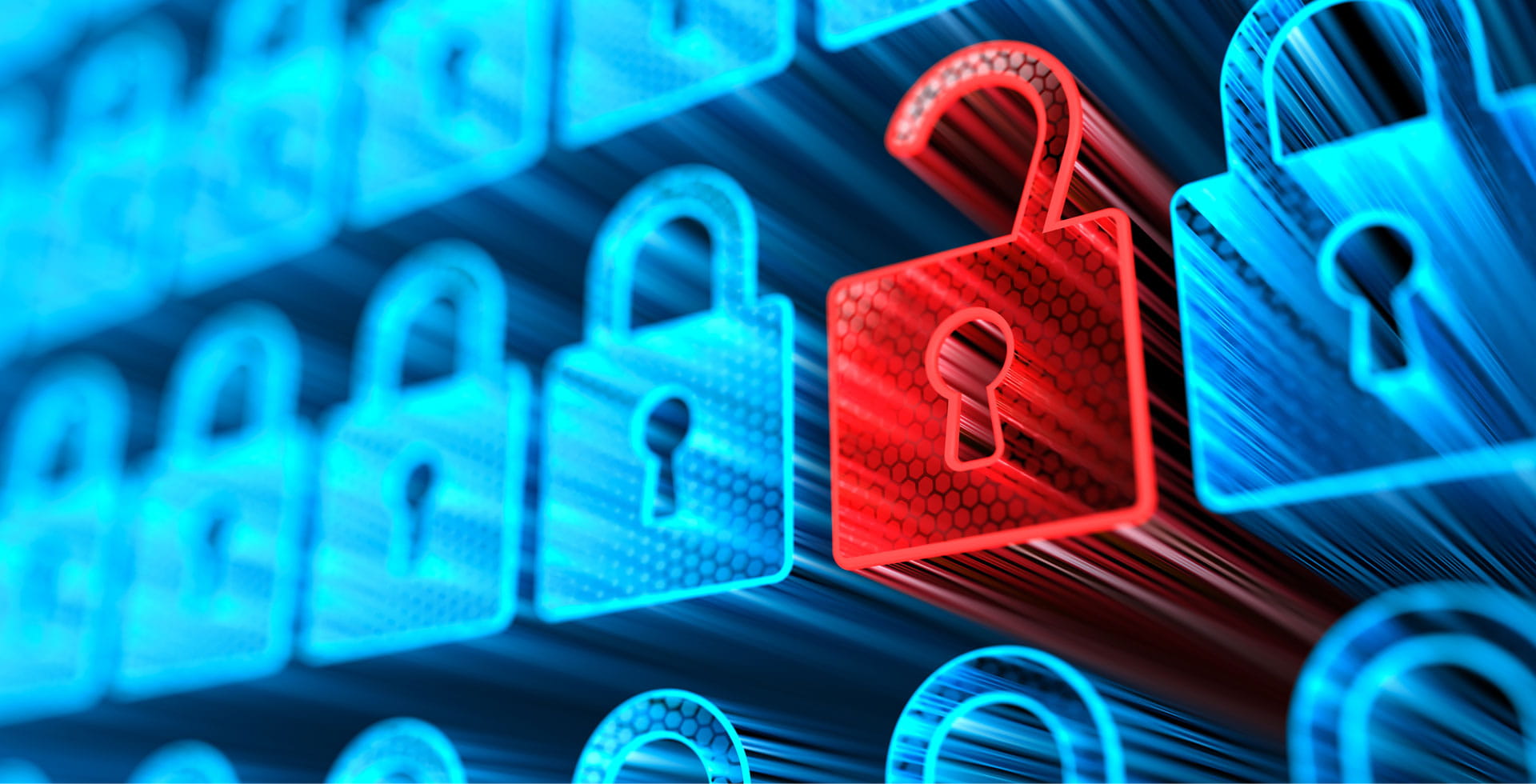Active is: Inventing new opportunities
AI and Cybersecurity – Ushering in a new era

Summary
Cybersecurity is the practice of protecting computers, mobile devices, and other digital assets from malicious attacks. Over the last few decades, cyberattacks have become an evolving danger to both organisations and individuals. The growth of technology has led to more interconnectedness of organisations’ systems as well as a greater individual online presence.
Cybercriminals are capitalising on this change as there are more opportunities to access or destroy sensitive data. As a result, effective cybersecurity is becoming a necessity for organisations of all types and sizes. 1
Key takeaways
- As more of our life goes digital, cybersecurity is becoming criticial to protect our data and assets.
- AI is ideally suited to solve some of the most harmful cyber threats, as this environment rapidly evolves.
- Governments and new legislation are expected to enforce a high priority on cybersecurity spending by corporations.
|
|
Download the article here |
Impact of COVID-19 on Cybersecurity
COVID-19 has shed light on how unprepared organisations are when it comes to dealing with cybersecurity-related issues.
The switch to remote work and the uptake in the use of digital channels has led to a growing number of cybersecurity-related issues.
Many organisations and individuals are scrambling to update their systems and safeguard their data. This surge in threats has reinforced the need for security controls and vulnerability testing.
Companies are increasingly turning to Artificial Intelligence (AI) to help defeat the growing cyberattack threat vectors. It is mathematically impossible for even large corporate IT security teams to monitor all the threats and sift through hundreds of thousands of vulnerabilities. 2
For that reason, automation through AI and the use of Machine Learning algorithms is now actively being used to eliminate cyber threats.
The pandemic is catalysing changes in attitude towards cybersecurity, and well-positioned companies that can help tackle some of the most pressing cybersecurity issues are expected to see massive growth.
|
Cybercrime damage costs could hit $6 trillion annually by 2021, up from $3 trillion in 2015. |
High cost of cybercrime
Cybercrime costs include damage and destruction of data, stolen money, theft of intellectual property, theft of personal and financial data, embezzlement, fraud, reputational harm, and more. Cybercrime damage costs could hit $6 trillion annually by 2021, up from $3 trillion in 2015.
This change would represents the greatest transfer of economic wealth in history and would be more profitable than the global trade of all major illegal drugs combined. 3
AI boosting Cybersecurity
Companies around the world are working hard to find new solutions to combat and reduce cybercrime.
AI is proving to be the best and most ideally suited technology to solve some of the most difficult problems in the cybersecurity industry. By using AI and Machine Learning to automate threat detection, companies can respond to cyber threats more effectively than by using traditional
|
Before 2019, only about 20% of cybersecurity providers were employing AI. By the end of 2020, 63% of cybersecurity firms plan to deploy AI in their solutions. 4 |
Automation allows companies to differentiate between ‘good’ and ‘bad’ behaviour by using predictive models and past data.
These models are intelligent enough to detect and prevent numerous cybersecurity threats in real-time. By eliminating the need for human input, cybersecurity engineers are able to focus on other aspects of protection that might need more active attention. AI can also leverage data from current cyberattacks in other areas and industries around the world to constantly improve efficacy and detection rates.
Below are just a few examples of how AI is being used in cybersecurity 5:
Cybercrime and the Internet of Things (IoT)

An Internet of Things (IoT) device is a piece of hardware that transmits data from one place to another over the internet. IoT devices were one of the biggest technology crime drivers in 2018. In 2019, cyberattacks on IoT devices surged 300% given the proliferation of digital devices in our lives. 6 One of the main drivers of this rise have been IoT devices that were more vulnerable due to old firmware that had not been updated.
|
Cisco estimates that the number of IoT devices will be three times as high as the global population by 2023. 7 |
Most IoT devices were built with pure functionality in mind. They have very small OS and security is generally treated as an add-on.
This attitude has left IoT devices extremely susceptible to cyberthreats in the past. New standards for cybersecurity in IoT are being rolled out to better protect smart devices.
Another trend that emphasises the need for cybersecurity is rapid cloud adoption. The total amount of data stored in the cloud – which includes public clouds operated by vendors and social media companies, government-owned clouds, and private clouds – will be 100x greater in 2021 than it was in 2019. 8 Enterprises will require more sophisticated security solutions due to this accelerated cloud adoption.
Government and changes in legislation
Legislation, such as the General Data Privacy Regulation (GDPR) in the EU provides a tailwind to cybersecurity spending by corporations.
Under GDPR rules, companies that collect data on citizens in the European Union (EU) need to comply with requirements around strictly protecting customer data, even if they do not have a business presence within the EU. 9 Failure to comply may lead to heavy fines - as high as up to 4% of the company’s global revenue. Other countries around the world are likely to follow by implementing similar rules and standards.
In the United States, the National Association of Corporate Directors called for corporate boards to strengthen their cybersecurity competency and governance capabilities. 10 There are new expectations that all boards should have the ability to understand and the capability to deal with
In addition, a current bill in the US Congress: “Cybersecurity Disclosure Act of 2019”, if passed, would require public companies to either acquire cybersecurity expertise on the board or prove to the Securities & Exchange Commission that having the expertise is not necessary. 11
Organisations can no longer delay cybersecurity initiatives, and AI has proven to be the easiest and most efficient technology to aid this transformation.
Cybersecurity and the AI revolution
Safety and security have always been fundamental to the functioning of any society. As we move to a more digital world, the way we implement security is changing and there are many companies bringing new solutions to market to help fight the threats. CrowdStrike* is a leading cybersecurity company that provides next-gen endpoint security, threat intelligence, and incident response services. CrowdStrike provides a cloud platform that collects cyber-attack data and leverages AI to constantly improve the security profile of its customers’ devices. Splunk* develops software that allows companies to search, correlate, analyse, monitor, and report on data in real-time. Splunk’s technology can be a key building block to help AI systems ingest and analyse large volumes of unstructured and structured cybersecurity data. Okta* provides cybersecurity software to prevent identity-based attacks through its risk-based authentication and identity solutions that leverage Machine Learning and AI for contextual behaviour insights.
Conclusion
In many ways, AI was already being used to improve cybersecurity and fight cybercrime. However, with the expansion of technology and the switch to digital channels, AI’s role has become more important than ever. Automation and real-time detection are crucial as they are the most effective tools companies can implement to keep up with the growing number of cyberthreats. In the future, most sectors and companies of all sizes will require effective cybersecurity. Therefore, we believe patient investors will be rewarded for actively seeking out companies that are poised to aid the battle against cybercrime.
Allianz Global Artificial Intelligence
Artificial intelligence has been transforming our lives and disrupting industries for years and yet we are only at the beginning of this vast scope of opportunity. Our Allianz Global Artificial Intelligence fund offers investors global and diversified exposure to the Artificial Intelligence theme.
It is not built to be a technology fund.
The fund invests across the full market capitalisation. However, our focus is on mid-cap and large-cap instead of primarily on mega-cap companies. Most importantly, we are investing along the full value chain from technology companies that develop infrastructure and enable the application of AI, to the companies across many sectors and industries adopting AI in their products, solutions and business processes.
Artificial Intelligence will disrupt every industry in the future and so offers plenty of diverse investment opportunities for those with the right knowledge and expertise.
Our portfolio management team is based in San Francisco, providing them unique access to many of the key players in this space.
This results in a continuous dialogue with both established players and start-ups, plus a better understanding of how AI is developing and proliferating.
In addition, the Allianz Global Investors Global Research platform provides a global, cross-sector perspective.
With a comprehensive understanding of the underlying technology and businesses, our team is best placed to understand the opportunities that Artificial Intelligence presents for all areas of the global economy.
Sources:
1 Digital McKinsey and Global Risk Practice, “Cybersecurity in a Digital Era,” McKinsey & Company (June 2020) https://McKinsey.com
2 Gauran Banga, “How to Create a Dream Team for the New Age of Cybersecurity.” (February 2020)
https://DarkReading.com/cloud/how-to-create-a-dream-team-for-the-new-age-of-cybersecurity/a/d-id/1333849
3 Cybersecurity Ventures Official Annual Cybercrime Report 2019
4 “Reinventing Cybersecurity with Artificial Intelligence,” Capgemini Research Institute https://Capgemini.com/wp-content/uploads/2019/07/AI-in-Cybersecurity_Report_20190711_V06.PDF
5 Teju Shyamsundar, “AI Is Changing Security—Here’s How,” (January 2020) https://Okta.com/blog/2020/01/ai-is-changing-security-heres-how
6 Zak Doffman, “Cyberattacks On IoT Devices Surge 300% In 2019, ‘Measured In Billions’, Report Claims,” (September 2019)
https://Forbes.com/sites/zakdoffman/2019/09/14/dangerous-cyberattacks-on-iot-devices-up-300-in-2019-now-rampant-report-claims/#281bde785892
7 Cisco Annual Internet Report (2018–2023) White Paper (March 2020) https://Cisco.com/c/en/us/solutions/collateral/executive-perspectives/annual-internet-report/white-paper-c11-741490.html
8 “Cybersecurity CEO: The World Will Need to Cyber Protect 100X More Cloud Data by 2021,” Cybersecurity CEO, Herjavec Group (October 2018)
https://RobertHerjavec.com/cybersecurity-ceo-cyber-protect-100x-cloud-data
9 Micheal Nadeau, “General Data Protection Regulation (GDPR): What you need to know to stay compliant,” CSO (June 2020)
https://csoonline.com/article/3202771/general-data-protection-regulation-gdpr-requirements-deadlines-and-facts.html
10 “Cyber-Risk Oversight Handbook For Corporate Boards,” OAS
11 Chenxi Wang, “Corporate Boards Are Snatching Up Cybersecurity Talents,”
(August 2019) https://Forbes.com/sites/chenxiwang/2019/08/30/corporate-boards-are-snatching-up-cybersecurity-talents/#615246a479f5
Important information:
* This is no recommendation or solicitation to buy or sell any particular security. A security mentioned as example above will not necessarily be
comprised in the portfolio by the time this document is disclosed or at any other subsequent date.
Investing involves risk. The value of an investment and the income from it may fall as well as rise and investors might not get back the full amount invested.
Allianz Artificial Intelligence is a sub-fund of Allianz Global Investors Fund SICAV, an open-ended investment company with variable share capital organised under the laws of Luxembourg. The value of the units/shares which belong to the Unit/Share Classes of the Sub-Fund that are denominated in the base currency may be subject to a strongly increased volatility.
The volatility of other Unit/Share Classes may be different. Past performance is not a reliable indicator of future results. If the currency in which the past performance is displayed differs from the currency of the country in which the investor resides, then the investor should be aware that due to the exchange rate fluctuations the performance shown may be higher or lower if converted into the investor’s local currency.
This is for information only and not to be construed as a solicitation or an invitation to make an offer, to conclude a contract, or to buy or sell any securities.
The products or securities described herein may not be available for sale in all jurisdictions or to certain categories of investors.
This is for distribution only as permitted by applicable law and in particular not available to residents and/or nationals of the USA. The investment opportunities described herein do not take into account the specific investment objectives, financial situation, knowledge, experience or specific needs of any particular person and are not guaranteed.
The views and opinions expressed herein, which are subject to change without notice, are those of the issuer companies at the time of publication.
The data used is derived from various sources, and assumed to be correct and reliable at the time of publication. The conditions of any underlying offer or contract that may have been, or will be, made or concluded, shall prevail.
The duplication, publication, or transmission of the contents, irrespective of the form, is not permitted; except for the case of explicit permission by Allianz Global Investors GmbH.
For investors in Europe (excluding Switzerland)
For a free copy of the sales prospectus, incorporation documents, daily fund prices, key investor information, latest annual and semi-annual financial reports, contact the management company Allianz Global Investors GmbH in the fund’s country of domicile, Luxembourg, or the issuer at the address indicated below or (Regulatory.AllianzGI.com).
Austrian investors may also contact the Austrian information agent Allianz Investmentbank AG, Hietzinger Kai 101-105, A-1130 Vienna.
Please read these documents, which are solely binding, carefully before investing.
This is a marketing communication issued by Allianz Global Investors GmbH (AllianzGI.com) an investment company with limited liability, incorporated in Germany, with its registered office at Bockenheimer Landstrasse 42-44, 60323 Frankfurt/M, registered with the local court Frankfurt/M under HRB 9340, authorised by Bundesanstalt für Finanz¬dienstleistungsaufsicht (BaFin.de).
Allianz Global Investors GmbH has established branches in the United Kingdom, France, Italy, Spain, Luxembourg, Sweden, Belgium and the Netherlands.
Contact details and information on the local regulation are available here (AllianzGI.com/Info).
For investors in Switzerland
For a free copy of the sales prospectus, incorporation documents, daily fund prices, key investor information, latest annual and semi-annual financial reports, contact the management company Allianz Global Investors GmbH in the fund’s country of domicile, Luxembourg, the Swiss funds’ representative and paying agent BNP Paribas Securities Services, Paris, Zurich branch, Selnaustrasse 16, CH-8002 Zürich or the editor either electronically or by mail at the given address or (Regulatory.AllianzGI.com).
Please read these documents, which are solely binding, carefully before investing. This is a marketing communication issued by Allianz Global Investors (Schweiz) AG, a 100% subsidiary of Allianz Global Investors GmbH.
AdMaster: 1369261
Investing for a sustainable future

Summary
The United Nations Sustainable Development Goals (SDGs) reflect a global consensus on the most urgent environmental and societal issues. A new crop of investments built around the SDGs are helping investors to direct capital into potential growth companies, while also addressing the biggest issues facing the planet.
Key takeaways
|





